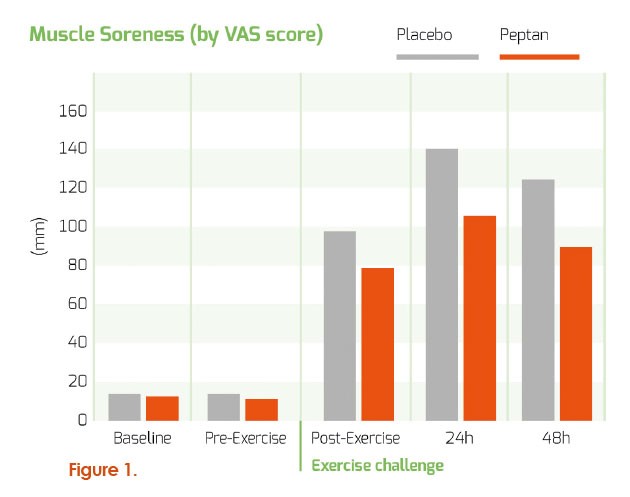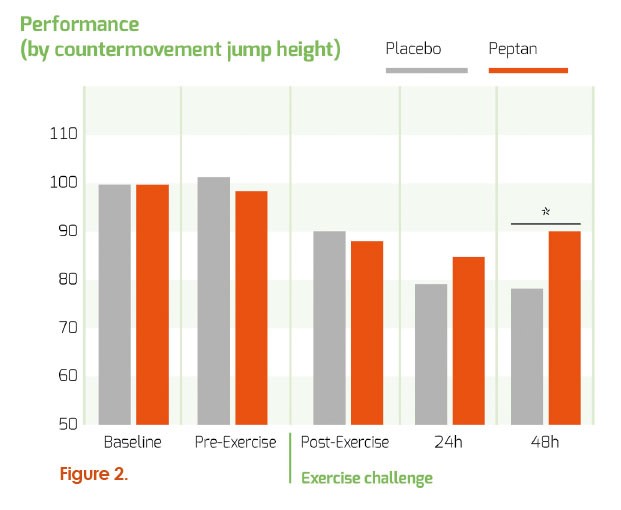STRIDING AHEAD: PUSHING THE BOUNDARIES OF SPORTS NUTRITION AND RECOVERY WITH COLLAGEN PEPTIDES


REFERENCES
- Hyldahl, R.D., Hubal, M.J., 2014. Lengthening our perspective: morphological, cellular, and molecular responses to eccentric exercise. Muscle & Nerve, 49(2):155-70
- Clifford, T, et al., 2019, The effects of collagen peptides on muscle damage, inflammation and bone turnover following exercise: a randomized, controlled trial. Amino Acids
https://doi.org/10.1007/s00726-019-02706-5 - Growing fitter, stronger and healthier (whitepaper), Peptan, Rousselot Health & Nutrition, November 2018
- Shaw, G. et al., 2016, Vitamin C-enriched gelatin supplementation before intermittent activity augments collagen synthesis. American Journal of Clinical Nutrition, 105(1):136-143 10 Clifford, T, et al., 2019, The effects of collagen peptides on muscle damage, inflammation and bone turnover following exercise: a randomized, controlled trial. Amino Acids
- Maughan RJ, et al. Br J Sports Med 2018;0:1–17
- Clifford, T, et al., 2019, The effects of collagen peptides on muscle damage, inflammation and bone turnover following exercise: a randomized, controlled trial. Amino Acids
https://doi.org/10.1007/s00726-019-02706-5 - Dar, Q.A. et al., 2017, Daily oral consumption of hydrolyzed type 1 collagen is chondroprotective and anti-inflammatory in murine posttraumatic osteoarthritis. PlosONE 12 (4): e0174705
- Minaguchi, J. et al., 2005, Effects of ingestion of collagen peptide on collagen fibrils and lycosaminoglycans in Achilles tendon. Journal of Nutritional Science and Vitaminology, 51:169-174
- Shaw, G. et al., 2016, Vitamin C-enriched gelatin supplementation before intermittent activity augments collagen synthesis. American Journal of Clinical Nutrition, 105(1):136-143
- Baar, K., 2015, Training and nutrition to prevent soft tissue injuries and accelerate return to play. Sports Science Exchange, 28(142):1-6
- Ribas-Fernandez, J.L. et al., 1998, Effects of gelatin hydrolysates in the prevention of athletic injuries. Archivos de Medicina del Deporte, 15(16):277-282
- Jiang J.X., et al., 2014, Collagen peptides improve knee osteoarthritis in elderly women: A 6-month randomized, double-blind, placebo-controlled study. Agro FOOD Industry Hi Tech, 25:19-23
- Clifford, T, et al., 2019, The effects of collagen peptides on muscle damage, inflammation and bone turnover following exercise: a randomized, controlled trial. Amino Acids
https://doi.org/10.1007/s00726-019-02706-5 - Ibid.
- Ibid.
- Ibid.
- Ibid.
Getting sports recovery right can go a long way for professional athletes, bodybuilders and sports enthusiasts alike, in not just achieving fitness goals but living a healthy, active lifestyle. Exercise challenges the human musculoskeletal system, which includes muscles, joints, bones, tendons and ligaments. The smallest muscle unit, the muscle cell, incorporates specialized proteins that generate movement. These cells form thin muscle fibers, which are wrapped into bigger muscle bundles by a sheath of extracellular matrix (ECM). During intense exercise, both the muscle cells and the ECM suffer microscopic damage that can result in swelling, pain and reduced strength — negatively affecting athletic performance and making even simple activities such as climbing or descending stairs difficult.
For professional athletes, the level of muscle damage determines the time of recovery between training sessions, as well as the intensity of the following training load. Among amateurs, the pain caused by intense exercise can easily disrupt the fitness routine. Professionals athletes and bodybuilders have long been the core group targeted with nutritional solutions that accelerate sports recovery. However, increasingly aware of their benefits, casual consumers have since become a key consumer category for these products, too.
THE IMPORTANCE OF SPORTS RECOVERY
To minimize disruptions to their fi tness program, both professionals and amateurs are increasingly turning to sports nutrition solutions that allow them to accelerate the recovery time after intense exercise. Targeted products formulated with the right nutrients can reduce inflammation and/or support muscle repair — speeding up the recovery time and ultimately, allowing consumers to maximize their health and fi tness in a sustainable way (1). Manufacturers are, as a result, looking for effective ingredient solutions that enable them to develop innovative products that appeal to consumers. In this article, Frank Engel, Global Market Development Manager Health & Nutrition at Rousselot®, will discuss the fi ndings of a study carried out by Rousselot and published in the peer-reviewed journal Amino Acids, which shows that the intake of (Peptan) collagen peptides contributes to a faster post-exercise recovery and performance improvement (2).
Once a niche market for professional athletes and bodybuilders, the sports nutrition industry has since created a strong appeal for more diverse consumer groups - from recreational athletes to those recognizing nutrition’s role in healthy aging. The emerging subgroups have different expectations and demands for sports nutrition products. Recreational athletes - including the so called weekend warriors - for example, are drawn to trusted brand names that offer wholesome solutions with short, recognizable ingredient lists.
While healthy agers are looking for natural products that help them maintain joint and bone health to remain active throughout the later life stages, lifestyle users (often young professionals) are willing to invest in products that support their high-performance lifestyle and allow them to meet their fitness goals. To create a strong appeal for these lifestyle users, sports nutrition producers must offer convenient, clean label products with high functionality, as well as provide scientific proof for product claims. A newly emerging consumer category, mobile consumers are likely to continuously track their fitness and health performance with wearable smart devices and apps and are looking for personalized nutrition solutions that support their fitness and wellbeing journey (3).
Addressing the diverse needs of consumers - from clean labels to science-backed product claims - is crucial for sports nutrition producers to meet demand and stay at the forefront of the industry. Selecting the most effective ingredient solution that is proven and safe is a vital first step to achieve this. Backed by science, collagen peptides - a hydrolyzed form of collagen — tick all the boxes and allow sports nutrition producers to cater to the various needs of consumers (4).
The positive impact of collagen peptides supplementation in sports is increasingly recognized by relevant bodies worldwide, such as The International Olympic Committee (IOC) — which highlighted collagen peptides in its literature review on the benefits of sports nutrition supplements (5).
WHO ARE TODAY’S SPORTS NUTRITION USERS?
Finding the right partner who can not only supply high-quality ingredient solutions but also provide formulation expertise and market know-how, is vital for manufacturers to develop targeted sports nutrition concepts that address consumers’ diverse needs. This will allow them to drive innovation, meet demand and stand out in a crowded marketplace. Part of Darling Ingredients, Rousselot Health & Nutrition can support manufacturers throughout the product development process, from R&D, formulation, regulatory approvals and branding to co-innovation with Rousselot’s global network of experts.
JOINING FORCES
The study performed by Rousselot also indicates that the intake of (Peptan) collagen peptides speeds up the post-exercise recovery time and improves performance (6).
Having already established Peptan’s ability to improve joint and bone health to support mobility, as well as its pain-alleviating and anti-inflammatory capabilities (7-12) - Rousselot focused on the impact of Peptan supplementation on sports recovery in this research (13).
Two specific indicators of exercise-induced muscle damage were investigated: muscle soreness and function (14). The study was designed as a double-blind, randomized, placebo-controlled trial, in which 24 active young men were given a daily dosage of either 20g of Peptan or a placebo for nine days, including a run-in period of seven days to allow the supplement to take effect. This was followed by the intense physical exercise of 150 drop jumps aimed at inducing muscle damage (15).
The results proved that supplementation with Peptan collagen peptides lowered muscle soreness (Figure 1) and improved performance (Figure 2) in the period after the exercise, indicating that Peptan helps to accelerate the recovery process after muscle-damaging exercise (16). In addition to this data and considering that collagen is a key component of the extracellular matrix sheath that enwraps the muscle fibers, it is expected that Peptan supplementation either prevents damage to the sheath or repairs it faster (17). This will allow professional athletes to increase their training load and casual users to minimize disruptions to their fitness program.
By implementing Peptan collagen peptides into product formulation, sports nutrition manufacturers can create effective, trusted and safe solutions that appeal to both professional athletes and sports enthusiasts.


PEPTAN® COLLAGEN PEPTIDES: MEETING THE NEEDS OF TODAY AND TOMORROW
COMPANY INSIGHT
ROUSSELOT
Rousselot
For more information, visit www.rousselot.com
or contact the author at frank.engel@rousselot.com